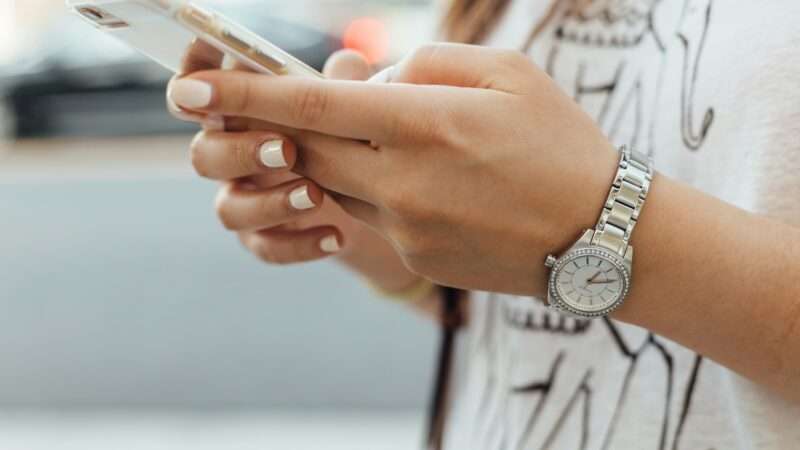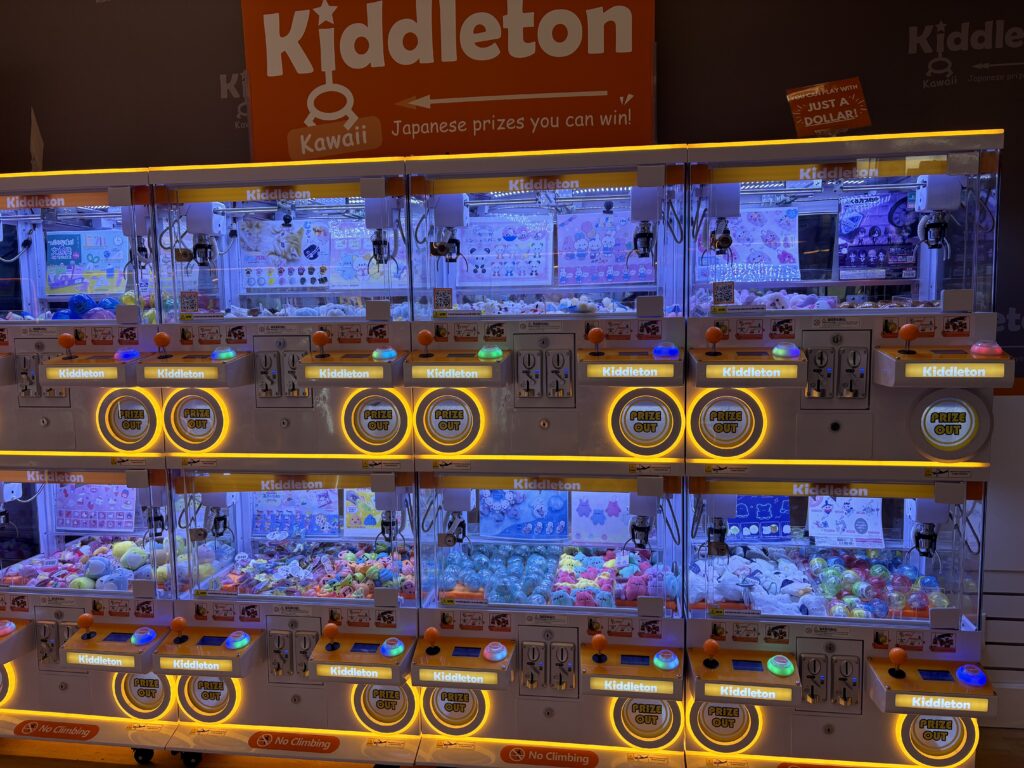
A majority of American parents want kids to have access to their phones at school, a new survey finds. In addition, most parents think cellphones have a positive effect on their kids' lives.
Debates over teens and smartphones often contain the (assumed or explicit) premise that parents want their kids to stop living what author and social psychologist Jonathan Haidt calls a "phone-based childhood." Popular wisdom today says parents think phones are negatively impacting their childrens' lives and want kids to have less access to phones but feel powerless to change the situation—a premise baked into Haidt's new book, The Anxious Generation: How the Great Rewiring of Childhood Is Causing an Epidemic of Mental Illness (read my review here).
But a survey conducted earlier this month by the National Parents Union challenges this narrative.
Phones—the Perfect Vehicle for Helicopter Parenting
In The Anxious Generation, Haidt looks at the rise of various problems among young people and pinpoints two interlocking culprits: the ascendancy of a "phone-based childhood" and the decline of a "play-based childhood." Many folks see this as a simple one-way flow: phones came along and simply wiped out time or motivation for other pursuits. Haidt suggests a somewhat different sequence of events. As parents began to fear everything in the offline world (and instill this fear into their children), individual families and American society more broadly started denying children independence, autonomy, and unstructured free time. "Screen time" started to fill a void that parents, politicians, police, and our culture as a whole had already created.
The new National Parents Union survey perfectly illustrates the way fear-based parenting is driving phone-based childhoods.
In the survey—conducted in February among 1,506 parents of public school students grades K-12—66 percent of parents said their kids have a cell phone and most of these kids (79 percent) take their phones to school. Asked why parents' wanted this, the most common answers were so that kids could "use their phone if there is an emergency" (79 percent agreed) and so parents could get in touch with their children "or find out where they are when needed" (71 percent). Forty percent said it was important for communicating with kids "about their mental health or other needs during the day."
In other words, a lot of parents want their kids to have phones at school because these parents are anxious, afraid, and/or overzealously policing their progeny's whereabouts and feelings.
Hat tip to Bonnie Kristian for first identifying this paradox. "It is increasingly fashionable to talk about the risk phones pose to American kids, especially teenage girls," writes Kristian on Substack:
The dysfunction of the phone-based childhood has become impossible to ignore, thanks in no small part to Haidt's own work. We're all saying it: Make the kids put down their phones at dinner! Ban phones in school! Kick teenagers off social media or confine them to flip phones or take the phones away altogether!
But then there's the second level: When push comes to shove, whatever ideals they may spout about rejecting the phone-based childhood, average American parents want their middle and high schoolers to have phones, preferably smartphones with location tracking kept on their persons at all times.
Hey, Teachers, Leave Those Phones Alone
It seems parents are as attached to their kids having phones as their kids are. In light of this, it's unsurprising that many parents frown on policies that totally deny kids access to phones at school (even though the popular/political narrative around kids and phones suggests this is what parents want).
Fifty-six percent of the people surveyed by the National Parents Union said "students should sometimes be allowed to use their cell phones" in school, while just 32 percent said "students should be banned from using their cell phones, unless they have a medical condition or disability for which they need to use a cell phone."
Even among the group who said most students should be banned from using phones, only 30 percent wanted this ban to apply broadly (i.e., outside of class). Most said phones should be banned during academic instruction but allowed at other times, such as during lunch or recess or during periods between classes.
In keeping with this, relatively few of the parents surveyed supported school policies that keep kids' entirely away from their phones during the day.
Fifteen percent said schools should "require students to place their cell phones in a central location in their classroom, such as a cubby or holder, but don't lock them up" and 14 percent said they should "require students to place their cell phones in a locked cabinet or cell phone lockers in their classroom." Another 8 percent said schools should "lock up students' cell phones in secure pouches or containers that they can carry with them but that prevent them from using their phone."
The most popular answer—shared by 59 percent of the parents surveyed—was that schools should "allow students to keep their phones in their backpack or bag (not locked
up) as long as they don't take them out and keep them on silent."
Reassuringly, very few people (5 percent) think the federal government should make decisions about school phone policies and only 10 percent say it should be a state-level government decision.
Most parents think phone policies should be made at the school district level (29 percent), the school level (28 percent), or at the classroom level (18 percent).
The Upsides of Screen Time
Some of the data in this survey fits popular narratives about kids and phones, like the ideas that they're starting young and spending a lot of time on them.
Among parents who allowed their children to have cellphones, the most popular ages to have given phones to them was between 10 and 13 years old. (The survey does not say what type of phones were given, so it's possible many kids received dumb phones to start.) Only 13 percent of parents waited until a kid was age 14 or older.
Among those whose kids had cell phones, only 18 percent estimated that their child spends less than 2 hours per day on it. Some 28 percent estimated that their kid spends between 2 and 3 hours per day on their phones, with 29 percent suggesting their kid uses it for 4 or 5 hours per day, 12 percent saying 6 or 7 hours per day, and 9 percent saying their kids are on phones for upwards of 8 hours per day.
And yet, most parents seem pretty unalarmed by this phone usage. Just 9 percent said phones had a mostly or entirely negative effect on their kids.
Nearly half—46 percent—said the phone had a mostly or entirely positive effect on their child, while 42 percent said the effect was "about equally positive and negative."
This stands out as at odds with what we commonly hear in the media and from legislators about how parents view kids' phone use. But it's in keeping with what many kids themselves say. In a 2022 survey of American 13- to 17-year-olds, conducted Pew Research Center, kids identified all sorts of plus sides to social media (which is, of course, one of the main things that kids use phones for). And a majority—59 percent—said social media is neither a negative nor a positive in their lives, while 32 percent said it's mostly positive and just 9 percent said it's mostly negative.
It's also in keeping with some earlier research on phone adoption among kids. For instance, a 2022 study from Stanford Medicine researchers followed 250 tweens and teens for five years during which most got a first cellphone, tracking study participants' well-being during this transition. The kids were 7 to 11 years old when the study started and 11 to 15 years old when it ended. The researchers "found that whether or not the children in the study had a mobile phone, and when they had their first mobile phone, did not seem to have meaningful links to their well-being and adjustment outcomes," according to lead author Xiaoran Sun.
More Sex & Tech
• Florida Gov. Ron DeSantis signed a law restricting teen use of social media platforms. Under the new law, 14- and 15-year-olds can old start social media accounts with their parents' permission. "This law puts all users' privacy at risk by mandating age verification," said Competitive Enterprise Institute's director of the Center for Technology & Innovation, Jessica Melugin. It also "ignores parents' rightful role in deciding what is and is not appropriate for their child, and may sacrifice too much of the free flow of speech to be constitutional. It's political click bait, but it's not good public policy."
• California lawmakers are considering a bill that would require large online platforms to verify the identities of "influential" users. Influential here is defined to include basically any user that's been at it for a while (that is, if content they've shared "has been seen by more than 25,000 users over the lifetime of the accounts that they control or administer").
• Mother Jones has an interesting interview with Lynn Paltrow, founder of the National Advocates for Pregnant Women (now called Pregnancy Justice). "For much of the past 50 years, the mainstream pro-choice groups were focused almost exclusively on the right to abortion," said Paltrow, who believes this was a mistake. "There was no campaign to explain abortion as necessary to the full equality and citizenship—the personhood—of women in this country. They were defending abortion as opposed to the people who sometimes need abortions but always need to be treated as full constitutional persons under the law, whatever the outcome of their pregnancies."
Today's Image

The post Parents Don't Want Schools to Confiscate Kids' Phones appeared first on Reason.com.







